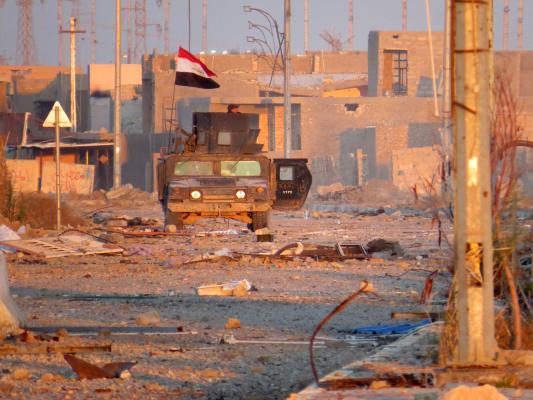RAMADI, Iraq, Jan 18 (Reuters) – When ISIS militants fleeing the Iraqi military’s advance in Ramadi tried to force Mohammed Nafaa to follow them across the city for the fourth time in as many months, he and his family hid inside and hoped to be left alone.
After the militants retreated again last week, Iraq’s elite counter-terrorism forces evacuated Nafaa and scores of other residents who had been hiding for around ten days, steering them to safety through streets mined with explosives.
Ramadi has been touted as the first major success for Iraq’s U.S.-backed army since it collapsed in the face of ISIS lightning advance across the country’s north and west in mid-2014.
But clearing the city from militants and explosives could take weeks. And the discovery of more civilians than expected trapped among the ruins, after what the survivors say was a deliberate effort by fighters to use them as shields, suggests future battles against ISIS could be more complicated.
Contrary to initial estimates in the hundreds, commanders say their forces have so far extricated about 3,800 civilians from Ramadi, a city of hundreds of thousands of residents largely evacuated after ISIS seized control in May.
The counter-terrorism forces, which spearheaded Ramadi’s recapture with the help of hundreds of U.S.-led coalition air strikes, have had to shift gears from direct combat to humanitarian relief, according to the commanders.
“We’re not that prepped to deal with civilians, but we just improvised on the ground,” said Colonel Arkan, who declined to provide his last name. “We’re giving help and support and care on one hand and fighting at the same time.”
Strict rules of engagement may have limited civilian casualties in the city, but they have slowed the military’s advance and allowed militants to escape to northern and eastern outskirts.
Ramadi is the capital of Anbar province, the fertile Euphrates river valley running from the Syrian border to the outskirts of Baghdad, where Sunni Muslim tribes have resented the Shi’ite-led central government since U.S. troops toppled Saddam Hussein in 2003.
ISIS fighters’ determination to hide among civilians in Ramadi raises concerns about upcoming battles in Mosul, ISIS northern stronghold which Prime Minister Haider al-Abadi has vowed to retake this year, and Falluja, the longest-held militant city sitting at Baghdad’s western gates.
“Falluja is full of families, not like Ramadi… And in Mosul more than 70 percent of the (two million) residents are still there,” said General Fadel Barwari, a senior counter-terrorism officer.
“The biggest problem is how we enter the city while they are using families as human shields,” he told Reuters on Saturday at a command centre in southern Ramadi. “They don’t care how many they kill; the only thing they care about is Islamic State.”
The combination of counter-terrorism forces and coalition air strikes is expected to be critical in future battles, with the rest of the army, police and irregular forces composed mainly of Iranian-backed Shi’ite Muslim militias and some Sunni tribal fighters providing support and holding land.

